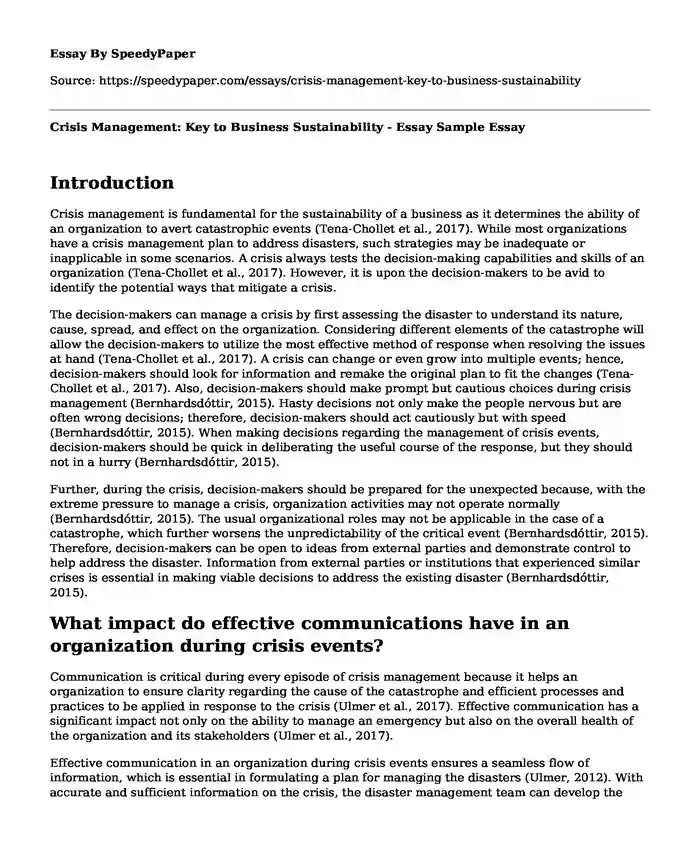
| Type of paper: | Essay |
| Categories: | Management Business Crisis management |
| Pages: | 3 |
| Wordcount: | 712 words |
Introduction
Crisis management is fundamental for the sustainability of a business as it determines the ability of an organization to avert catastrophic events (Tena-Chollet et al., 2017). While most organizations have a crisis management plan to address disasters, such strategies may be inadequate or inapplicable in some scenarios. A crisis always tests the decision-making capabilities and skills of an organization (Tena-Chollet et al., 2017). However, it is upon the decision-makers to be avid to identify the potential ways that mitigate a crisis.
The decision-makers can manage a crisis by first assessing the disaster to understand its nature, cause, spread, and effect on the organization. Considering different elements of the catastrophe will allow the decision-makers to utilize the most effective method of response when resolving the issues at hand (Tena-Chollet et al., 2017). A crisis can change or even grow into multiple events; hence, decision-makers should look for information and remake the original plan to fit the changes (Tena-Chollet et al., 2017). Also, decision-makers should make prompt but cautious choices during crisis management (Bernhardsdóttir, 2015). Hasty decisions not only make the people nervous but are often wrong decisions; therefore, decision-makers should act cautiously but with speed (Bernhardsdóttir, 2015). When making decisions regarding the management of crisis events, decision-makers should be quick in deliberating the useful course of the response, but they should not in a hurry (Bernhardsdóttir, 2015).
Further, during the crisis, decision-makers should be prepared for the unexpected because, with the extreme pressure to manage a crisis, organization activities may not operate normally (Bernhardsdóttir, 2015). The usual organizational roles may not be applicable in the case of a catastrophe, which further worsens the unpredictability of the critical event (Bernhardsdóttir, 2015). Therefore, decision-makers can be open to ideas from external parties and demonstrate control to help address the disaster. Information from external parties or institutions that experienced similar crises is essential in making viable decisions to address the existing disaster (Bernhardsdóttir, 2015).
What impact do effective communications have in an organization during crisis events?
Communication is critical during every episode of crisis management because it helps an organization to ensure clarity regarding the cause of the catastrophe and efficient processes and practices to be applied in response to the crisis (Ulmer et al., 2017). Effective communication has a significant impact not only on the ability to manage an emergency but also on the overall health of the organization and its stakeholders (Ulmer et al., 2017).
Effective communication in an organization during crisis events ensures a seamless flow of information, which is essential in formulating a plan for managing the disasters (Ulmer, 2012). With accurate and sufficient information on the crisis, the disaster management team can develop the processes and practices needed for the management of the predicament (Ulmer, 2012). Effective communication of the crisis management plan also encourages cooperation among the key stakeholders of the organization, which is fundamental to crisis management (Ulmer, 2012). Similarly, when communicated effectively, the employees, customers, or other critical stakeholders of the organization turn out to be efficient support and a source of effectual solutions to managing the disaster (Ulmer, 2012).
Conclusion
Finally, effective communication facilitates the recovery of an institution (Ulmer, 2012). When a crisis occurs, it is the small elements of misleading information within and outside the organization that gins up rumors such as the business shutting down due to damages (Ulmer et al., 2017). Such information not only destroys the reputation of the company but also discourages members of the organization from participating in the recovery of the business, thus undermining its ability to recover (Ulmer et al., 2017). Therefore, effective communication ensures all organization members are informed of the crisis and participates in the recovery process after the disaster.
References
Bernhardsdóttir, Á. E. (2015). Crisis-Related Decision-Making and the Influence of Culture on the Behavior of Decision Makers. New York, USA: Springer.
Tena-Chollet, F., Tixier, J., Dandrieux, A., & Slangen, P. (2017). Training decision-makers: Existing strategies for natural and technological crisis management and specifications of an improved simulation-based tool. Safety science, 97, 144-153. https://doi.org/10.1016/j.ssci.2016.03.025
Ulmer, R. R. (2012). Increasing the impact of thought leadership in crisis communication. Management Communication Quarterly, 26(4), 523-542. https://doi.org/10.1177/0893318912461907
Ulmer, R. R., Sellnow, T. L., & Seeger, M. W. (2017). Effective crisis communication: Moving from crisis to opportunity. Sage Publications.
Cite this page
Crisis Management: Key to Business Sustainability - Essay Sample. (2023, Nov 24). Retrieved from https://speedypaper.net/essays/crisis-management-key-to-business-sustainability
Request Removal
If you are the original author of this essay and no longer wish to have it published on the SpeedyPaper website, please click below to request its removal:
- Industrialization of Multinational Enterprises, Essay Sample for Everyone
- Performance Measurement and Improvement, Free Essay in Management
- Corporate Crisis Management Essay Example
- Free Essay: Financial Engineering to Enhance Shareholders' Value
- Essay Sample on Risk Management Strategies
- Essay Sample on A Career in Risk Management
- Essay Sample on Key Elements Impacting the Medicare Legal and Financial Reimbursement Practices
Popular categories




